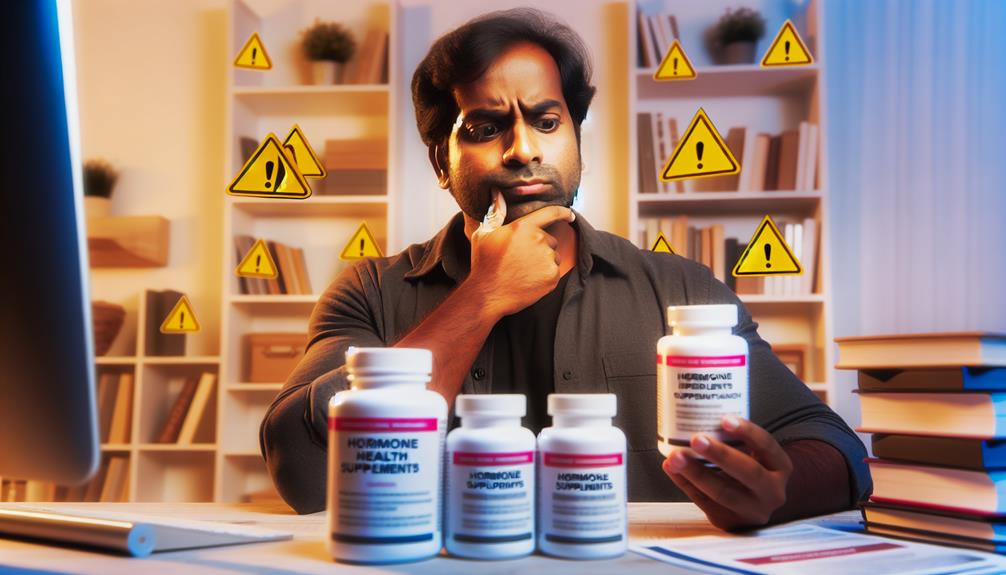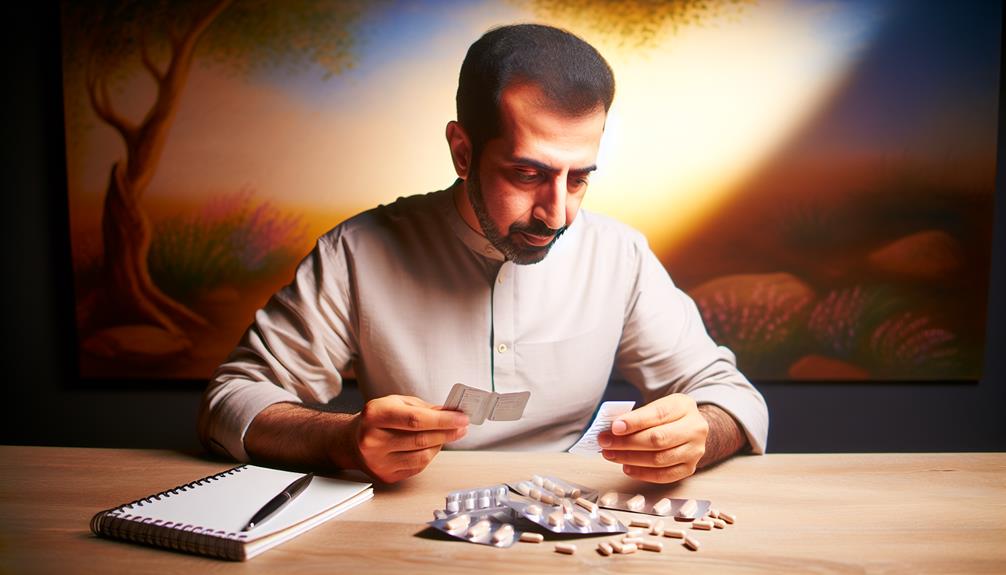Before starting hormone health supplements, I think it's vital to evaluate several factors. First, I assess my personal health goals and current lifestyle, as well as any medications I'm on. Consulting with a healthcare professional helps me understand my specific hormone levels and potential side effects. I also research the supplement ingredients to guarantee safety and effectiveness. Monitoring dosage carefully is essential to avoid imbalances. Finally, being aware of long-term effects can prevent future health complications. By considering these aspects, I pave the way for better hormone health, and there's so much more to uncover.
Understanding Hormone Health

Hormone health is often overlooked, but it plays an essential role in our overall well-being. I've come to realize just how significant hormones are in regulating various functions in our bodies. Hormones are chemical messengers that influence everything from mood and energy levels to metabolism and reproductive health. It's fascinating how a small fluctuation in hormone levels can lead to noticeable changes in our physical and emotional states.
For instance, I've noticed that when my testosterone levels dip, I feel more fatigued and less motivated. This isn't just a personal experience; many men face similar challenges as they age. Hormone fluctuations can occur due to various factors, such as stress, diet, and lifestyle choices. Understanding how these fluctuations impact our hormone functions can empower us to make better health decisions.
I believe it's important to listen to our bodies and recognize the signs of imbalance. If I'm feeling unusually tired, irritable, or experiencing weight gain, it might be time to reflect on my hormone health. It's not just about taking supplements; it's about understanding the underlying causes of these fluctuations and addressing them holistically.
In my journey toward better health, I've learned that managing hormone levels is not a one-size-fits-all approach. Everyone's body is different, and what works for one person might not work for another. So, before diving into hormone health supplements, it's essential to understand what's happening in our bodies and approach it with informed care.
Identifying Personal Health Goals
Before diving into hormone health supplements, it's crucial to identify your personal health goals. Knowing what you want to achieve not only clarifies your path but also fuels your personal motivation. Are you looking to boost energy levels, increase muscle mass, or enhance mood? Each of these objectives requires a different approach, and understanding your primary aim can make a significant difference in your journey.
Goal setting is more than just scribbling down what you want; it's about creating a clear roadmap. I've found that breaking down broader goals into smaller, measurable milestones helps maintain focus and motivation. For instance, if my goal is to increase muscle mass, I might set specific targets like lifting a certain weight or committing to a workout schedule. This way, I can track my progress and adjust my approach as needed.
It's also important to reflect on how these goals align with your overall lifestyle. Are your aspirations realistic? Setting unattainable expectations can lead to frustration, while achievable goals can boost confidence and encourage long-term commitment. Reflect on your daily routine, work commitments, and personal interests to guarantee your goals are sustainable.
Ultimately, identifying your personal health goals isn't just about supplements; it's a holistic process. By understanding your motivations and setting clear objectives, you'll be better prepared to make informed decisions about hormone health supplements and their role in your overall wellness journey.
Consulting Healthcare Professionals

Seeking guidance from healthcare professionals is an essential step when considering hormone health supplements. I can't stress enough how important it is to consult with a doctor before diving into any supplement regime. They can provide personalized advice based on your unique health profile, which is significant for informed decision-making.
Here are three key reasons to consult a healthcare professional:
- Personalized Doctor Recommendations: Every individual's body reacts differently to supplements. A healthcare professional can assess your specific hormonal levels and recommend supplements that align with your health goals.
- Understanding Treatment Options: A doctor can explain various treatment options available to you. Whether it's hormone therapy or lifestyle changes, they'll help you explore all avenues, ensuring you choose the best path for your well-being.
- Monitoring Health Effects: Starting any new supplement can come with risks. A healthcare professional can help monitor your health and evaluate the effectiveness of the supplements, adjusting your treatment plan as needed to avoid potential side effects.
Evaluating Current Medications
When considering hormone health supplements, it's essential to evaluate any current medications you're taking. Understanding your medication history is fundamental, as certain supplements can lead to drug interactions that may compromise your health. I've found that being proactive about this can save me from potential complications.
Here's a quick reference table that outlines common medications and potential interactions with hormone health supplements:
| Medication | Common Uses | Potential Interaction |
|---|---|---|
| Blood Thinners | Prevent blood clots | Supplements can affect clotting ability |
| Antidepressants | Treat depression | Hormones may alter mood stabilization |
| Blood Pressure Meds | Manage hypertension | Supplements might cause fluctuations in blood pressure |
| Diabetes Medications | Control blood sugar levels | Hormonal changes can impact insulin sensitivity |
| Anti-inflammatory Drugs | Reduce inflammation | Supplements may increase or decrease effectiveness |
Before starting any hormone health supplement, I recommend reviewing this table with your healthcare provider. They can help you assess your medication history and identify any possible drug interactions that might arise. It's not just about what supplements to take; it's about ensuring that they work harmoniously with your existing medications. By taking these precautions, you can enhance your hormone health without risking your overall well-being. Remember, knowledge is power when it comes to your health!
Assessing Lifestyle Factors

Understanding your current medications is just one piece of the puzzle; lifestyle factors play a significant role in hormone health as well. I've realized that our everyday choices can greatly influence hormone balance, which is why it's important to evaluate these lifestyle habits. Here are three key areas to reflect on:
- Dietary Choices: What we eat directly impacts our hormone levels. A balanced diet rich in whole foods, fruits, and vegetables can support hormone production. On the other hand, excessive sugar and processed foods can lead to imbalances.
- Physical Activity: Regular exercise is essential for maintaining hormone health. It helps reduce stress and improve sleep quality. Incorporating both aerobic and strength training can enhance overall wellness and hormone function.
- Stress Management: Chronic stress can wreak havoc on our hormones. Finding effective ways to manage stress, whether through mindfulness, hobbies, or relaxation techniques, can lead to better mental health and hormone stability.
Additionally, I can't overlook the effects of alcohol consumption and smoking. Both can negatively impact hormone levels and overall health. Prioritizing sleep quality is also important; poor sleep can disrupt hormone production and contribute to mood swings.
Researching Supplement Ingredients
When I'm considering hormone health supplements, I always start by looking into the ingredients. It's essential to understand the evidence supporting their efficacy, as well as any potential safety concerns or side effects. This research helps me make informed choices that align with my health goals.
Ingredient Efficacy Evidence
Steering through the world of hormone health supplements can feel a bit like wandering through a maze, especially when it comes to ingredient efficacy. It's vital to do your homework on what's really in these products. Here's what I've focused on in my research:
- Clinical Studies: Look for supplements backed by solid clinical studies. This evidence can help you gauge if an ingredient genuinely works as claimed.
- Ingredient Sourcing: Knowing where ingredients come from matters. High-quality sourcing often indicates better formulation quality and absorption rates.
- User Testimonials: Real-life experiences can shed light on how effective a supplement is. Positive user testimonials can offer insights, but be wary of overly enthusiastic claims.
When evaluating supplements, I consider ingredient synergy—how different components work together—and the brand's reputation within the industry. Regulatory standards are also important, as they guarantee the product meets safety and quality guidelines. Finally, check the dosage forms to confirm they align with your needs. By taking these steps, you can navigate the maze more effectively and make informed choices about hormone health supplements.
Safety and Side Effects
Before diving into hormone health supplements, it's essential to evaluate the safety and potential side effects of the ingredients involved. I can't stress enough how important it is to research each component. Many supplements contain herbs or compounds that can interact with medications you're already taking. These supplement interactions can lead to unexpected side effects or reduce the effectiveness of your current treatments.
Additionally, consider any allergy concerns you might have. Some ingredients are derived from common allergens like soy, shellfish, or gluten, and it's critical to avoid anything that could trigger an allergic reaction. I've seen cases where men overlooked these details, leading to unnecessary discomfort or even serious health issues.
Always read labels carefully and consult with a healthcare professional before starting any new regimen. This step helps guarantee that you're not only choosing safe supplements but also those that align with your unique health needs. Remember, just because something is marketed as "natural" doesn't mean it's free from risks. Taking the time to research will empower you to make informed decisions about your hormone health.
Recognizing Potential Side Effects

When considering hormone health supplements, it's vital to recognize the potential side effects they may carry. I've learned that common risks can vary widely based on individual health factors, so it's important to stay vigilant. Monitoring any changes after starting a supplement can help guarantee I'm making safe choices for my well-being.
Common Hormone Supplement Risks
Many people may not realize that taking hormone health supplements can come with a range of potential side effects. As someone who's navigated this landscape, I want to share some of the common risks that you should be aware of.
- Hormone Fluctuations: These supplements can cause significant changes in your hormone levels, leading to unexpected mood swings, fatigue, or even sleep disturbances.
- Supplement Interactions: It's crucial to reflect on how these supplements might interact with other medications or supplements you're already taking. Combining certain substances can amplify side effects or reduce the effectiveness of your treatment.
- Long-term Health Effects: The long-term implications of hormone supplementation aren't fully understood. Some studies suggest potential risks to cardiovascular health or prostate issues that could arise over time.
Being informed about these risks can help you make a better decision. Consulting with a healthcare professional is essential to guarantee that you're not only addressing your hormone health but also protecting your overall well-being. Remember, what works for one person might not work for another, so personal research and professional guidance are key.
Individual Health Considerations
Maneuvering the world of hormone health supplements can feel overwhelming, especially when reflecting on your unique health profile. It's essential to contemplate your individual medical history before diving into any supplementation. I recommend starting with hormone level testing, as it provides a clear picture of what you might need.
Don't overlook lifestyle disease implications; conditions like diabetes or heart disease can greatly influence how your body responds to supplements. Additionally, keep in mind age-related considerations; hormone levels naturally change as we grow older, and understanding this can help tailor your approach.
A nutritional deficiencies assessment is vital too, since lacking key vitamins or minerals can affect your overall hormone health. Genetic predispositions also play a role in how your body processes these supplements, so it's wise to reflect on your family history.
Lastly, evaluating your metabolic rate and physical activity levels is key. If you're not managing stress effectively or staying active, the psychological health impact can hinder your hormone balance as well. By reflecting on these factors, you'll be better equipped to make informed decisions about hormone health supplements.
Monitoring Side Effects
As you consider your unique health profile and begin exploring hormone health supplements, it's equally important to stay vigilant about potential side effects. Monitoring these effects is essential for your overall well-being. I've learned that developing a system for side effect tracking can help you stay aware of how your body reacts. Here are three key areas to focus on:
- Physical Changes: Keep an eye on any unexpected changes in your body, like weight gain, fatigue, or muscle weakness. Document these changes to discuss with your healthcare provider.
- Mood Swings: Hormones can impact your mood considerably. Be conscious of any shifts in your emotional state, such as increased irritability or anxiety. Noticing these patterns can help in making necessary adjustments.
- Sleep Patterns: Hormone supplements might affect your sleep quality. Track any changes in your sleeping habits, whether it's insomnia or excessive drowsiness.
Importance of Dosage Guidelines
When it comes to hormone health supplements, understanding dosage guidelines is vital for achieving the desired benefits without risking adverse effects. I've realized that getting the dosage right isn't just about how much I take, but also how often I take it. Knowing the right dosage accuracy and dosage frequency can make a significant difference in my overall hormone health.
Here's a simple table to help visualize the importance of dosage:
| Aspect | Importance |
|---|---|
| Dosage Accuracy | Guarantees effectiveness and minimizes risk |
| Dosage Frequency | Affects hormone levels and overall balance |
| Adjustments | Personalized approach for individual needs |
Following these guidelines can help me avoid the pitfalls of self-medicating or over-supplementing. For example, taking too much of a supplement might lead to hormone imbalances, while taking too little may not yield any benefits at all. It's essential to read labels carefully and consult healthcare professionals, as they can provide tailored advice based on my specific health needs and conditions.
In my journey with hormone health supplements, I've learned that sticking to recommended dosages not only enhances effectiveness but also helps maintain a stable hormonal balance. Ultimately, taking the time to understand these dosage guidelines can empower me to make informed choices that support my health goals.
Considering Long-Term Effects

When considering hormone health supplements, I can't ignore the potential long-term effects they might have on my body. It's essential to think about how these supplements could impact my hormonal balance and what side effects might arise over time. Understanding these risks helps me make a more informed decision about my health.
Potential Side Effects
Before diving into hormone health supplements, it's essential to take into account the potential side effects that could arise, especially over the long term. I've learned that not all supplements are created equal, and the interactions with other substances can be tricky. Here are a few points I think we should consider:
- Herbal Interactions: Many supplements may contain herbs that can interact with prescription medications or other supplements. It's important to research and consult a healthcare professional before mixing anything.
- Dosage Variations: The right dosage can vary greatly from person to person. What works for one individual may lead to adverse effects in another. Keeping track of how your body responds is essential.
- Hormonal Imbalance: Long-term use of hormone supplements might disrupt your natural hormonal balance. This disruption can lead to unexpected side effects, such as mood swings or changes in libido.
Hormonal Balance Impact
A significant factor for anyone contemplating hormone health supplements is how they can impact hormonal balance over the long term. I've learned that our bodies rely on a delicate equilibrium maintained by the endocrine system. Introducing supplements can lead to hormonal fluctuations that might not be immediately apparent but can have lasting effects.
When I think about it, the idea of artificially boosting hormone levels sounds appealing, but it's essential to recognize that our bodies are complex. Disrupting this balance can lead to unexpected consequences, such as mood swings, energy dips, or even changes in libido. It's essential to take into account how these fluctuations can ripple through our overall health.
Moreover, I've come to understand that the body's feedback loops can react unpredictably. For instance, if I boost testosterone levels too high, my body might respond by lowering its natural production. This could lead to a dependency on supplements just to maintain normal levels.
Before diving into hormone health supplements, I encourage you to reflect on how these changes might affect your body over time. Understanding the long-term implications is important for making informed decisions about your hormonal health.
Long-Term Health Risks
Although many might focus on the immediate benefits of hormone health supplements, I believe it's essential to take into account the potential long-term health risks they can pose. Relying solely on supplements might lead to neglecting important lifestyle modifications, which can greatly impact our overall well-being.
Here are three key risks to reflect on:
- Hormonal Imbalance: Over time, excessive supplementation can disrupt your natural hormone production, leading to long-term imbalances that affect mental health, exercise routines, and even sleep quality.
- Chronic Health Issues: Depending on your age factors and genetic predispositions, some supplements may contribute to chronic health conditions, such as cardiovascular diseases or metabolic disorders that can be exacerbated by environmental influences.
- Dependency Risks: Relying heavily on these supplements can diminish personal motivation to adopt healthier dietary changes, effective stress management techniques, and consistent exercise routines, which are essential for sustainable health.
Incorporating these practices into our lives can help us thrive without the potential pitfalls of long-term supplement use. It's important to weigh the benefits against the risks and prioritize holistic health strategies.
Monitoring Progress and Health
Monitoring progress and health is essential when considering hormone health supplements. I've learned that tracking my progress isn't just about seeing changes in my body; it's about understanding how these supplements are impacting my overall well-being. Regular health assessments are vital in this journey. They provide a window into how my hormones are responding and whether the supplements are delivering the desired effects.
I make it a point to document my experiences, noting any changes in energy levels, mood, and physical performance. This progress tracking helps me identify patterns and make informed decisions. For instance, if I notice a significant improvement in my energy after a month, it's a sign that the supplement might be beneficial. Conversely, if I experience side effects or no noticeable changes, it may be time to reassess my regimen.
Additionally, I schedule routine health assessments with my healthcare provider. This isn't just about checking hormone levels; it's also an opportunity to evaluate my overall health. Blood tests can reveal whether my body is responding positively to the supplements or if adjustments are needed.
I've found that being proactive in monitoring my health has made a significant difference in my experience with hormone health supplements. By tracking my progress and staying engaged in regular health assessments, I'm not only taking charge of my hormone health but also ensuring that I'm on the right path toward achieving my wellness goals.
Making Informed Choices

As I reflect on my health assessments and the changes I've documented, it becomes clear that making informed choices is essential when it comes to hormone health supplements. With the vast amount of information available, it can be overwhelming to navigate the options. However, I've learned that a few key factors can guide my decisions and enhance supplement transparency.
- Research Ingredients: Before choosing a supplement, I always check the ingredients list. Understanding what each ingredient does can help me gauge its effectiveness and potential side effects.
- Consult Healthcare Professionals: I've found that discussing my options with a healthcare provider is invaluable. They can provide personalized advice based on my health history and current condition, helping me make informed decisions.
- Read Reviews and Testimonials: Looking at feedback from others who've used the supplements can offer insight into their efficacy and reliability. It's vital to reflect on both positive and negative reviews to get a balanced view.
Frequently Asked Questions
Can Hormone Supplements Interact With Over-The-Counter Medications?
I've often wondered if hormone supplements can interact with over-the-counter medications. It turns out they can! Supplement interactions can lead to unexpected medication side effects, which might complicate your health. It's essential to consult a healthcare professional before starting any new supplement, especially if you're already on medications. They can help you navigate potential risks and guarantee you're making safe choices for your well-being. Always better to be cautious!
What Age Is Appropriate to Start Considering Hormone Health Supplements?
When I think about the right age to start considering hormone health supplements, I believe age factors play a significant role. Typically, men notice changes in hormone balance in their late 30s to early 40s. It's during this time that symptoms like fatigue or decreased libido may arise. However, I'd recommend consulting a healthcare professional to evaluate your specific situation, as everyone's body responds differently, and personalized advice is key for ideal health.
Are There Natural Alternatives to Hormone Health Supplements?
I've often wondered about natural alternatives to hormone health supplements. I've found that herbal remedies, like ashwagandha and fenugreek, can support hormonal balance. Additionally, making lifestyle changes—like regular exercise, a balanced diet, and stress management—can greatly impact hormone levels. It's fascinating how our body responds to natural methods. If you're considering alternatives, I'd suggest researching these options and consulting a healthcare professional to tailor a plan that suits you best.
How Do I Know if I Need Hormone Supplements?
To figure out if I need hormone supplements, I start with a symptom assessment. I pay attention to changes in energy, mood, or libido. If something feels off, I consider getting hormone testing done. This helps me understand my levels better and see if supplementation could be beneficial. It's essential to approach this thoughtfully, as everyone's body is different, and what works for one person may not work for another.
Can Diet Influence Hormone Levels Without Supplements?
Oh sure, I could just pop a pill and hope for the best, right? But honestly, diet plays a huge role in hormone balance. I've discovered that what I eat can greatly impact my hormone levels. A diet rich in healthy fats, lean proteins, and plenty of fruits and veggies can promote a healthier hormonal environment. So, if you're looking to tweak your hormone balance, maybe start in the kitchen before reaching for those supplements!
